One of the biggest opportunities of search engine optimization (SEO) is performing keyword research and designing a content plan supported by the results of your research.
Keyword research helps you to:
- Understand your target audience’s search intent.
- Gather information about related topics and questions searchers often ask.
- Monitor the current competitive landscape for your topic.
All of these things can affect your resulting content quality.
Keyword research is crucial in shaping your article’s structure and creating something that meets your customers’ needs.
But not all website owners do it. Many think it requires complicated or paid keyword research tools — but that’s not necessarily true.
To show you don’t need to commit to premium plans to get used to these tools, we’ve listed the 15 best free keyword research tools below.
1. GetKeywords
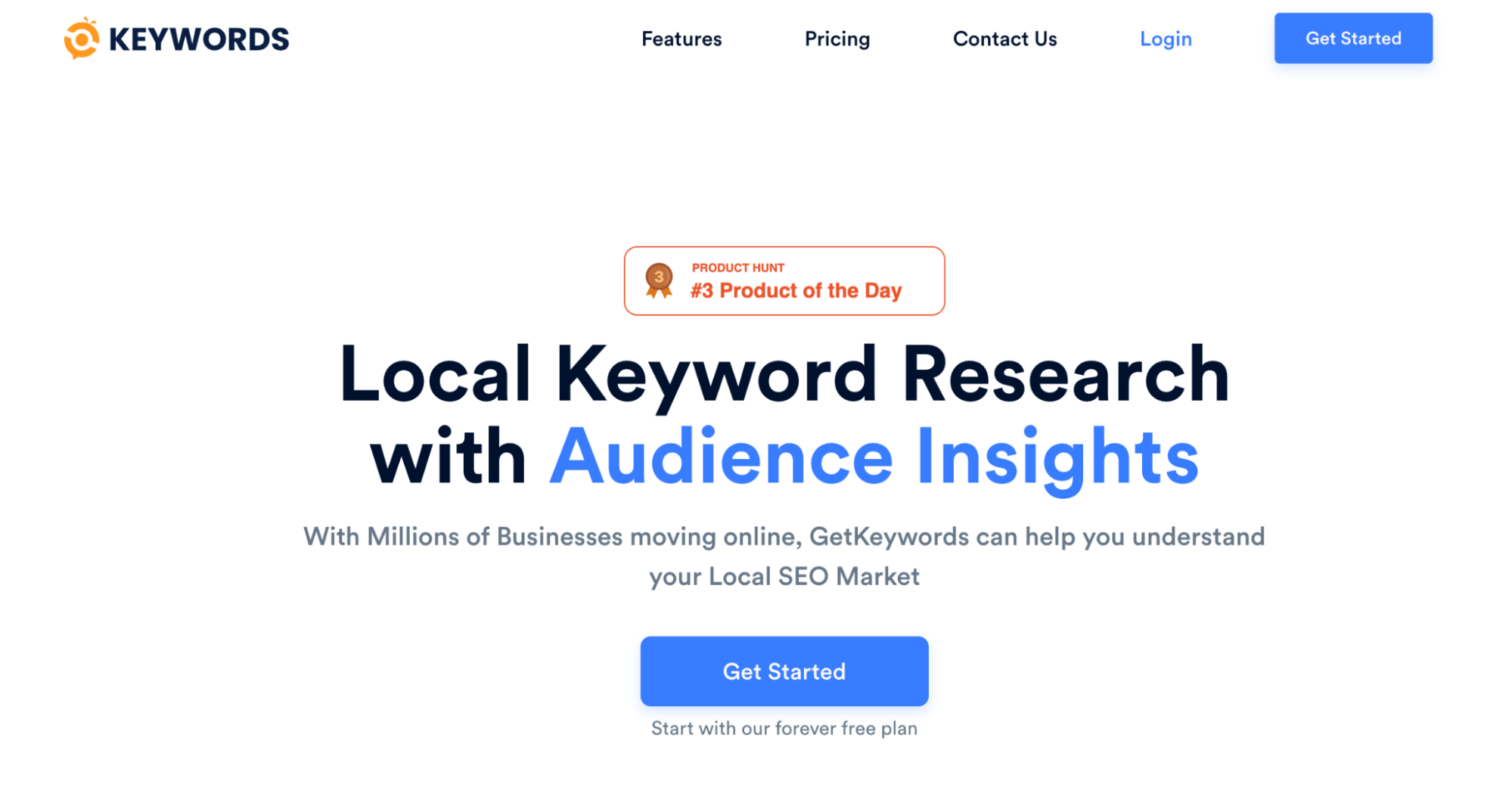 Screenshot from GetKeywords.io, February 2023
Screenshot from GetKeywords.io, February 2023GetKeywords is one of the best free keyword research tools for local SEO.
It supports keyword metrics for over 100,000 locations with filters that narrow down search results to countries, provinces, and cities.
It also has metrics that are usually unavailable in free keyword tools and supports up to 45 languages.
On top of that, GetKeywords shares real-time data, unlike many other keyword tools that use stored data.
Key Features:
- Real-time data analysis.
- Shares your audience’s preferred devices and competitors’ traffic sources.
- Provides global search.
Best Keyword Research Tool For: Local SEO.
Pricing: Free plan with unlimited searches. Premium plans for advanced features like SEO difficulty and competitor keywords start at $24/month when billed annually.
2. Sonar
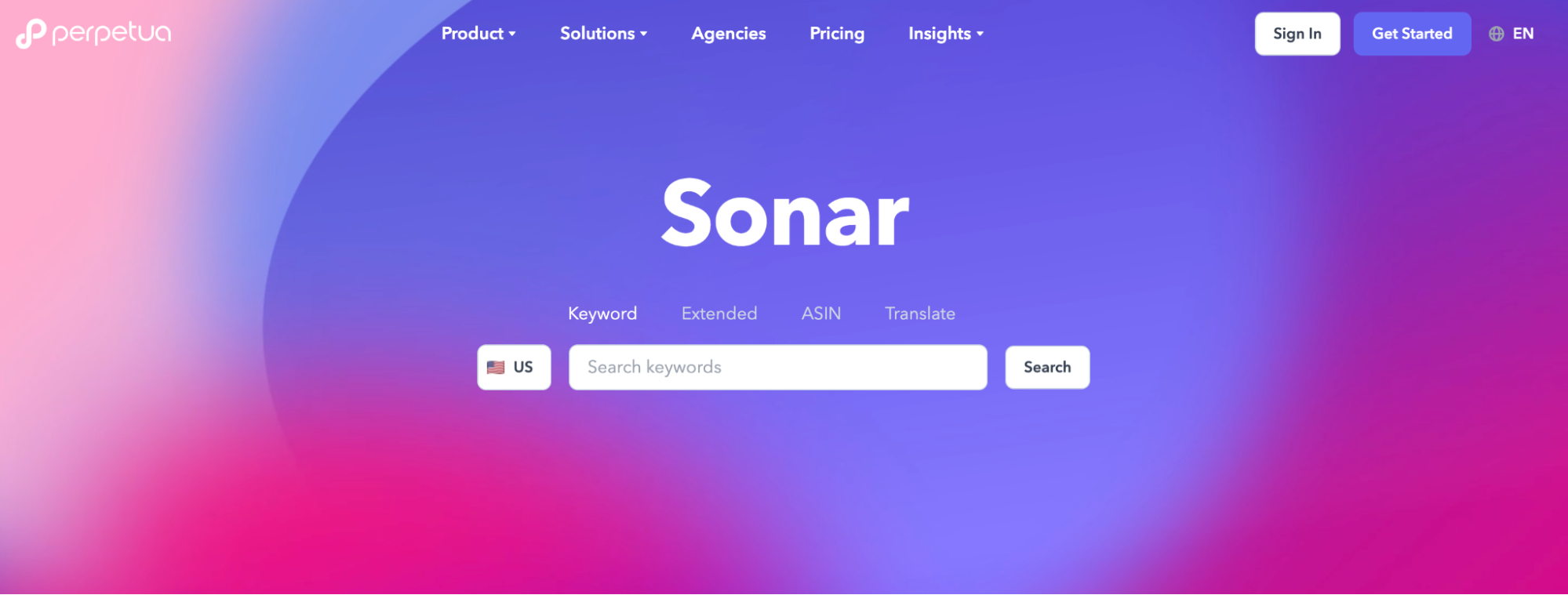 Screenshot from Perpetua.io, February 2023
Screenshot from Perpetua.io, February 2023If you need a basic keyword tool for Amazon keyword research, Sonar comes highly recommended.
Sonar has a database of over 180 million keywords in multiple languages, updated in real-time.
Its reverse Amazon Standard Identification Number (ASIN) lookup lets you identify and track competitors’ keywords.
Enter the competitor’s ASIN, and Sonar gives you the list of keywords the product is ranking for.
However, that’s the extent of its features.
Key Features:
- 180+ million keywords in multiple languages.
- Reverse ASIN lookup.
- No need to create a user account.
Best Keyword Research Tool For: Amazon sellers.
Pricing: Free.
3. QuestionDB
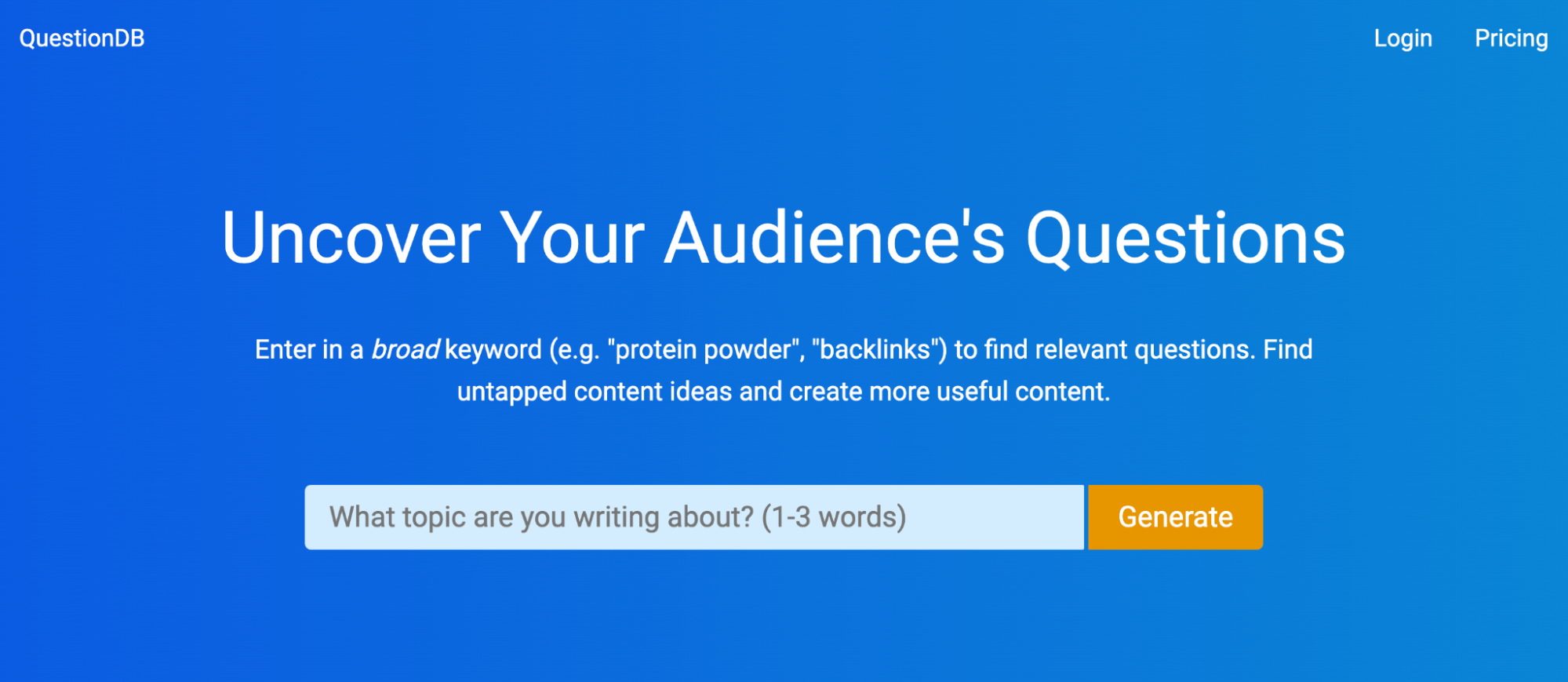 Screenshot from QuestionDB.io, February 2023
Screenshot from QuestionDB.io, February 2023Need new blog topic ideas? QuestionDB is one of the best free keyword research tools for that.
When you enter a seed keyword, QuestionDB generates common questions people ask on popular platforms such as Reddit, Stack Exchange, and Quora.
You gain insights into how customers think, generating relevant keywords based on what people are searching for.
Key Features:
- Gain insights into questions people commonly ask about a topic.
- Generate relevant content ideas based on what people search for.
- Multiple data sources (Reddit, Stack Exchange, Quora).
Best Keyword Research Tool For: Creating informative blog posts.
Pricing: Free with limited features. Premium plans start at $12.50/month when billed annually.
4. Ryan Robinson’s Keyword Tool
 Screenshot from Ryrob.com, February 2023
Screenshot from Ryrob.com, February 2023New or smaller websites should target keywords with medium search volume and low keyword difficulty.
Though many free keyword research tools don’t highlight this data, Ryan Robinson’s free AI-powered keyword research tool does.
Ryan Robinson is a professional blogger and as head of content at CRM provider Close, Ryan is familiar with content marketing pain points.
Key Features:
- Focuses on essential metrics: estimated search volume and suggested blog topics.
- Accompanied by a useful tutorial explaining the importance of keyword research to show you how to best use the tool.
- Get country-specific search data.
Best Keyword Research Tool For: Finding untapped phrases surrounding a keyword.
Pricing: Free.
5. Keyword Tool Dominator
 Screenshot from KeywordToolDominator.com, February 2023
Screenshot from KeywordToolDominator.com, February 2023If you’re a multichannel marketer or work in the ecommerce space, Keyword Tool Dominator is the tool for you.
It sources keywords from nine major retail databases (Amazon, Bing, eBay, Etsy, Google, Google Shopping, Home Depot, Walmart, and YouTube) for the best long-tail keywords.
However, the free plan limits you to two keyword searches daily and doesn’t offer keyword analysis.
Key Features:
- Unlimited real-time keyword searches (premium plans only).
- Unlimited keyword suggestions – including long-tail keywords.
- Export reports.
Best Keyword Research Tool For: Multichannel marketers.
Pricing: Free with limited features. Lifetime unlimited access to tools starts at $49, a one-time payment for each tool. The bundle that includes 6 keyword tools starts at $99.
6. Google Autocomplete
 Screenshot of search query for [best free keyword research tools], Google, February 2023
Screenshot of search query for [best free keyword research tools], Google, February 2023It depends on your level of awareness of the best free keyword research tools.
Google Search data may seem basic, but it offers a wealth of information you can use for keyword research, intent exploration, and content creation.
Key Features:
- Autocomplete: Shares search suggestions that include various long-tail keyword phrases that are variations of your primary keyword.
- People Also Ask: Shares questions that searchers ask related to your keyword. “People Also Ask” provides great opportunities for subheadings and featured snippets.
- Related Searches: Displays searches that don’t necessarily involve the same exact words as the primary keyword you typed in but are semantically related. These searches represent related topics that may make sense to bring up in your article based on what users are interested in learning and suggestions for future related topics to write.
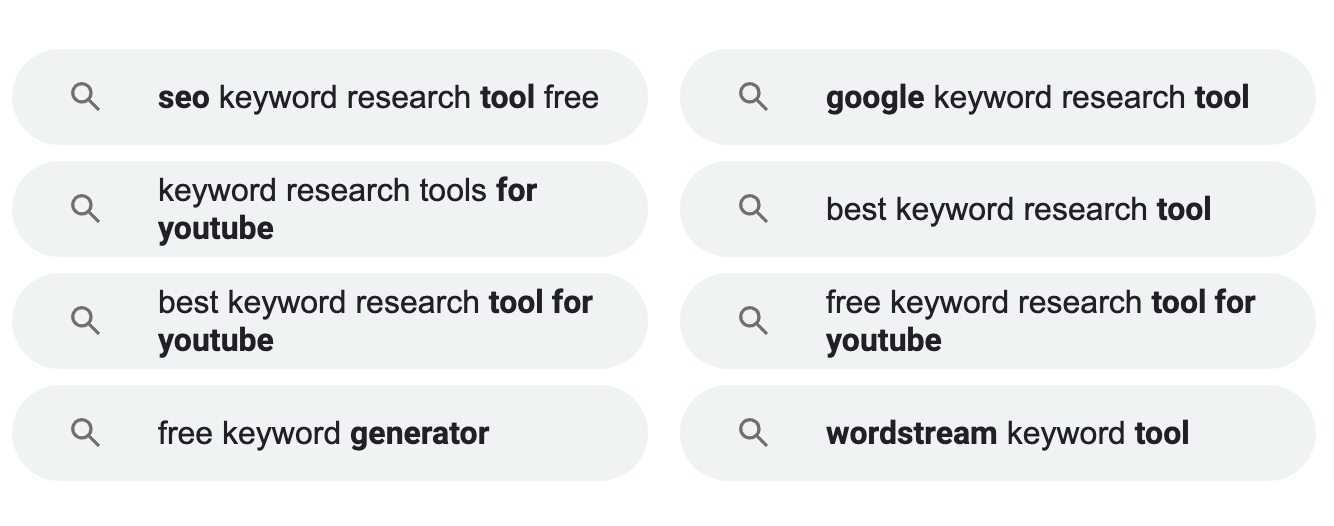 Screenshot of related searches section of search query [best free keyword research tools], Google, February 2023
Screenshot of related searches section of search query [best free keyword research tools], Google, February 2023- Things To Know: Google has been testing a search engine results page (SERP) feature that displays and arranges information about a topic into different categories. Clicking on the category will show a featured snippet about the topic.
 Screenshot of Google’s Things to Know section for the search query [programmatic advertisement], Google, February 2023.
Screenshot of Google’s Things to Know section for the search query [programmatic advertisement], Google, February 2023.Pricing: Free.
7. Keyword Tool
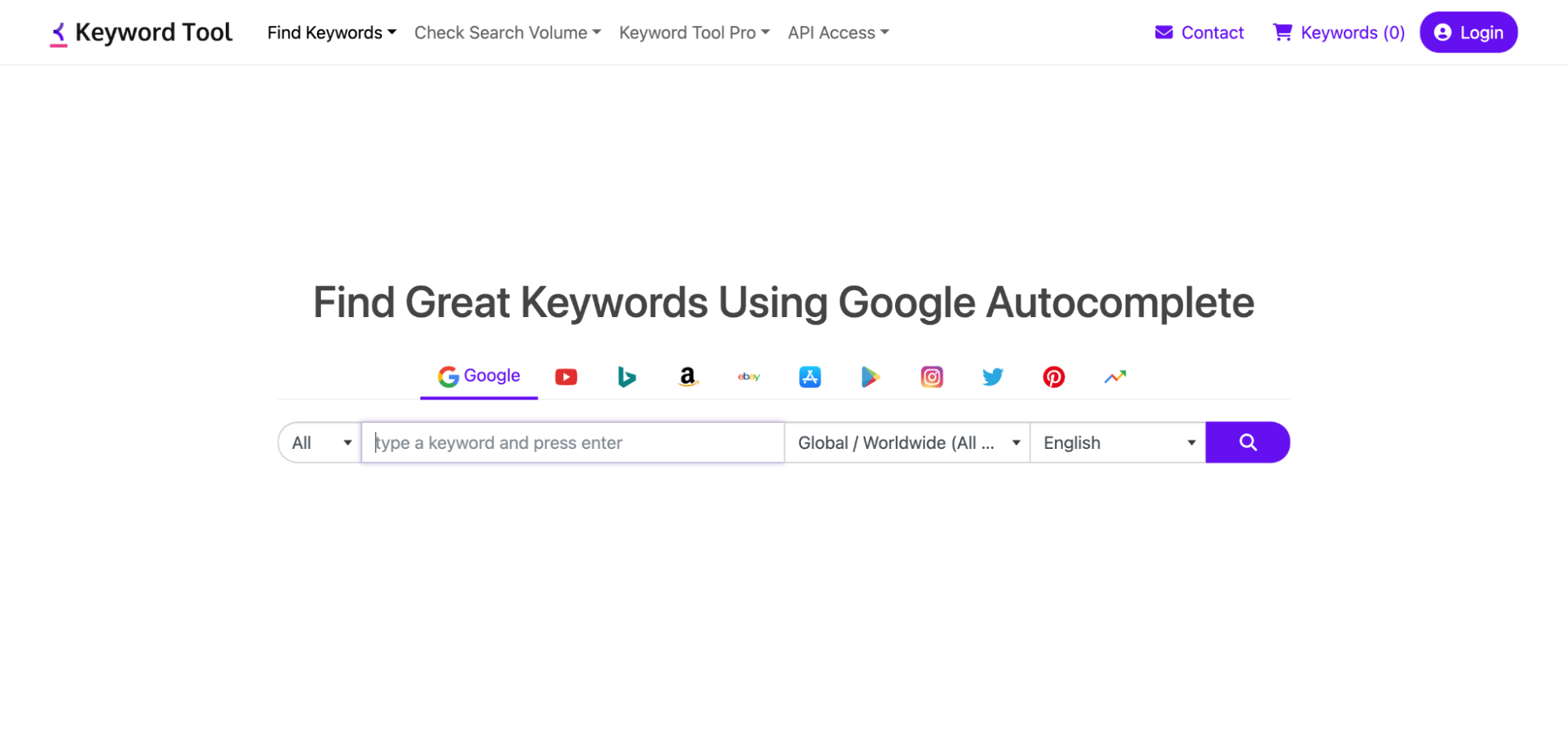 Screenshot from KeywordTool.io, February 2023
Screenshot from KeywordTool.io, February 2023Keyword Tool is a great alternative to Google Keyword Planner as it focuses on sources other than Google.
It uses data from various search engines, ecommerce websites, and social media platforms, such as Bing, YouTube, Amazon, eBay, Instagram, and Pinterest, to generate long-tail keywords that aren’t visible on Google’s Keyword Planner.
Choose the website and country you want to view data from, and Keyword Tool will generate a list of suggestions and questions based on autocomplete data from those sources.
Key Features:
- Generates up to 750+ long-tail keyword suggestions for every search term.
- Multiple data source inputs.
- No need to create a user account.
Best Keyword Research Tool For: Multichannel keyword research.
Pricing: Free plan available. The premium version starts at $69/month when billed annually.
8. Glimpse
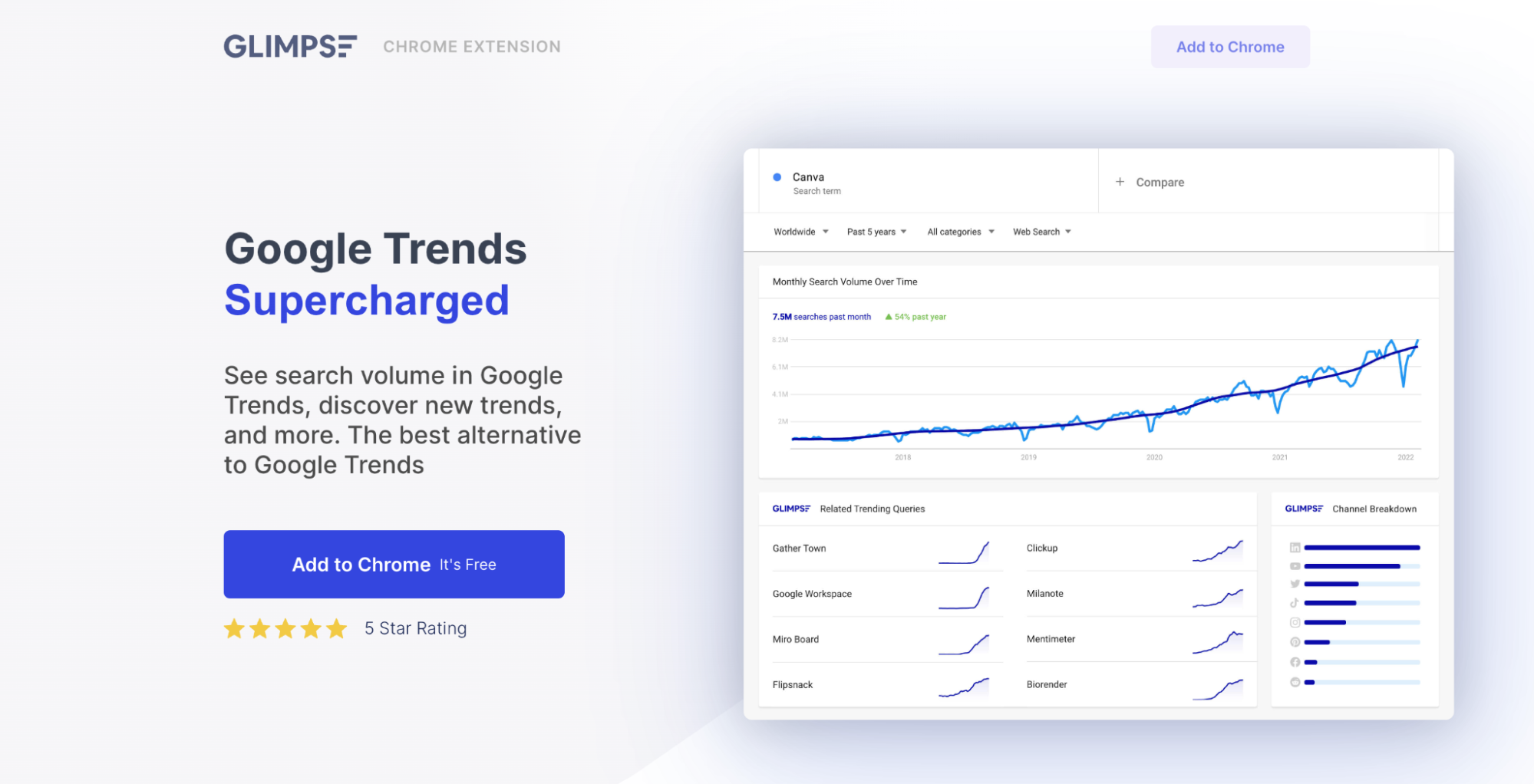 Screenshot from MeetGlimpse.com, February 2023
Screenshot from MeetGlimpse.com, February 2023Many SEOs use Google Trends to find new keywords they can rank for.
However, it’s only good for finding trends you’re already aware of – not predicting future trends.
Glimpse closes that gap by identifying upcoming search trends that are useful for people in the digital PR or ecommerce space.
Glimpse is a free Chrome extension with a limitation of 10 free credits a month.
Key Features:
- Long-tail search data.
- Set Google Trend alerts to alert you when a topic starts trending.
- A database of thousands of trends. It checks for popular and high-growth topics from websites outside Google, including Pinterest, Amazon, TikTok, and YouTube, so you can find business ideas before they become mainstream.
Best Keyword Research Tool For: Finding keyword trends.
Pricing: Free.
9. Keywords Everywhere
 Screenshot from KeywordsEverywhere.com, February 2023
Screenshot from KeywordsEverywhere.com, February 2023Keywords Everywhere is a freemium browser add-on for Firefox and Chrome.
It gathers keyword suggestions from over 15 of the most popular keyword tools, such as AnswerThePublic, Google Search, and Ubersuggest.
From there, it displays related keywords, keyword trends, and terms your competitors are ranking for.
Key Features:
- Collates data from popular keyword research tools like Ubersuggest, AnswerThePublic, Google Search, Google Analytics, Google Search Console, and Moz Open Site Explorer.
- Displays YouTube and Google Trends from 2004 onwards.
- Shares YouTube and Google traffic metrics (no volume data for the free version).
- Find keywords your competitors rank for (no volume data for the free version).
Best Keyword Research Tool For: Keyword research within search.
Pricing: Free with limited features. The Premium version uses the pay-as-you-go model. You can buy 100,000 credits (one credit = research data for one keyword) for as low as $10.
10. AlsoAsked
 Screenshot from AlsoAsked.com, February 2023
Screenshot from AlsoAsked.com, February 2023AlsoAsked is a freemium keyword research tool centered around Google’s “People Also Ask” (PAA) data.
When you enter a seed keyword, AlsoAsked suggests relationships between topics and illustrates them with a branching diagram that you can download as .CSV or .PNG files.
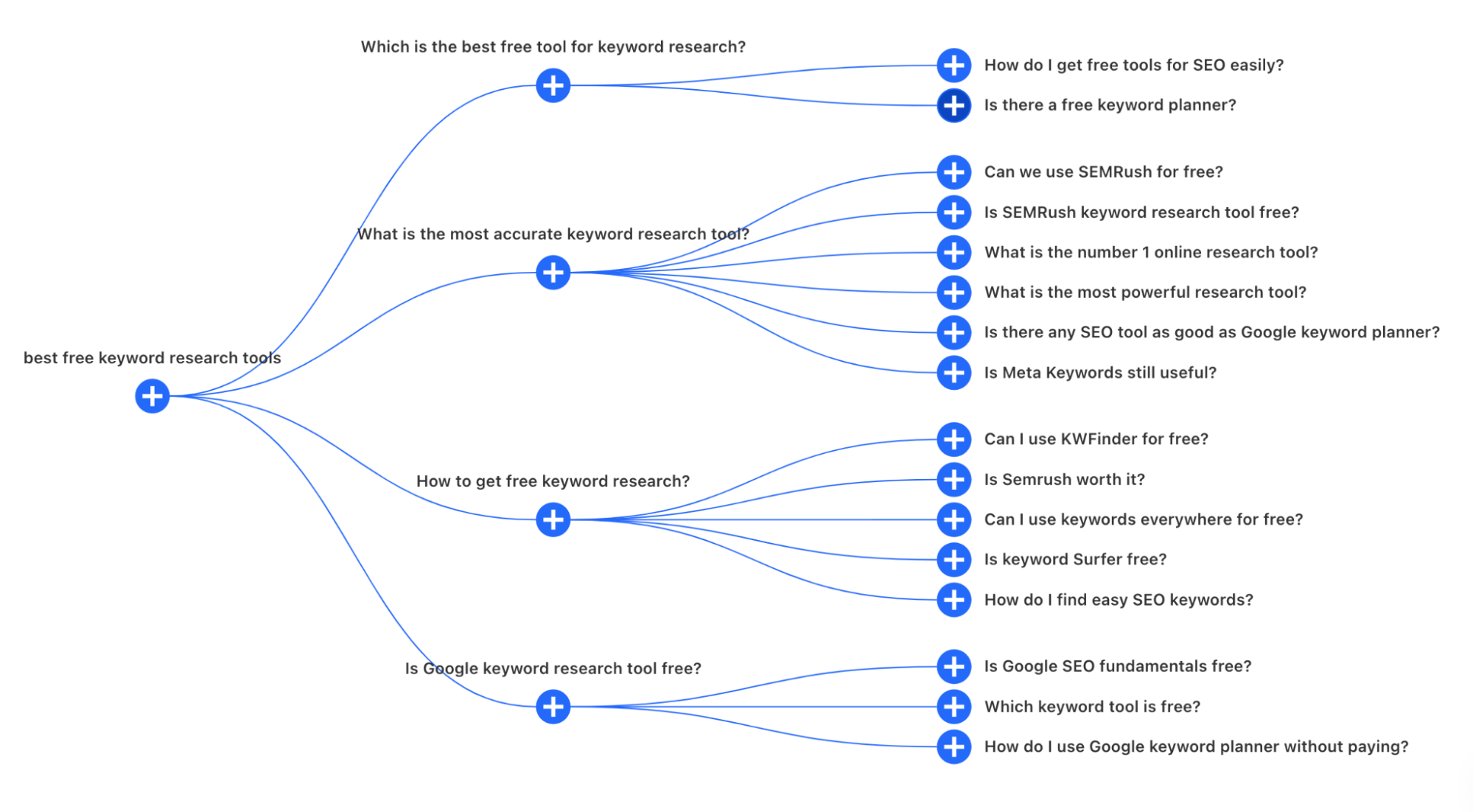 Screenshot of questions generated from the query [best free keyword research tools], AlsoAsked, February 2023
Screenshot of questions generated from the query [best free keyword research tools], AlsoAsked, February 2023However, AnswerThePublic focuses specifically on autocomplete data.
Key Features:
- Identify related keywords.
- Visualize keyword relationships.
- Export keyword data as .CSV or .PNG files.
Best Keyword Research Tool For: Content ideation and finding related questions people ask.
Pricing: Limited free trial available. Starts at $15/month.
11. Keyword Surfer
 Screenshot from SurferSEO.com, February 2023
Screenshot from SurferSEO.com, February 2023If you’re a digital marketer, Surfer’s free Chrome extension is one of the best free keyword research tools you can use.
Surfer’s free Chrome extension lets you see different keyword metrics without leaving the Google Search page. These metrics, which are tailored to each country, include the following:
- Estimated monthly search volume.
- Cost-per-click (CPC).
- Number of times the keyword is used on the page.
- Word count for competitors’ pages.
- Related keywords and those keywords’ overlap score and search volume.
The features offered are very powerful for a free tool – it’s no wonder it’s so popular.
Key Features:
- Dataset from 70 countries.
- Monitor and keep keywords you don’t want to forget (using the Collections folder).
- Export files using CSV.
Best Keyword Research Tool For: Finding overlapping keywords.
Pricing: Free.
12. Keyworddit
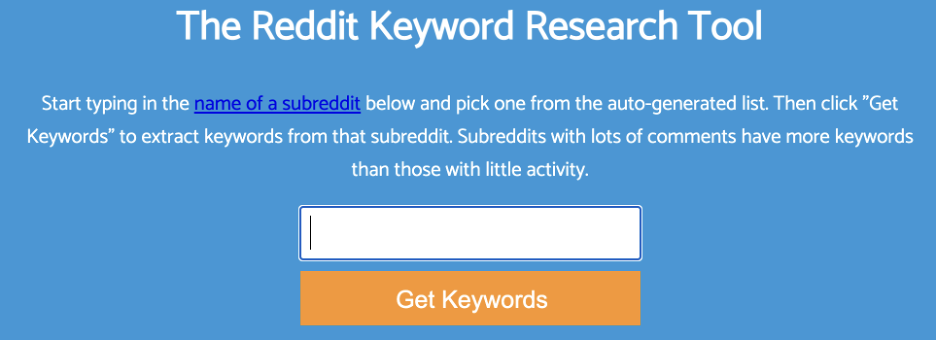 Screenshot from Highervisibility.com, February 2023
Screenshot from Highervisibility.com, February 2023Reddit is a goldmine for keyword ideas.
The website recognizes that and built Keyworddit – one of the best free keyword research tools to find keywords based on your target audience’s questions.
Keyworddit goes through subreddits (communities) representing your target audience’s characteristics.
With a specific niche in mind, run the subreddit names through Keyworddit. It will extract keywords that represent what engaged users frequently talk about.
Note that search volume is based on GrepWords (a keyword and SERP data platform), not Reddit search data.
Key Features:
- Identify the most popular topics on Reddit.
- Understand the specific topics that engage your audience.
- Includes a “Context” link that opens a Google search of the subreddit and keyword to see how people are using it on Reddit.
Best Keyword Research Tool For: Brands that want to market on Reddit.
Pricing: Free.
13. Jaaxy
 Screenshot from Jaaxy.com, February 2023
Screenshot from Jaaxy.com, February 2023Jaaxy is one of the best free SEO keyword research tools for affiliate marketers.
Like other tools, it shows:
- Related keywords.
- The average number of monthly searches for each keyword.
- Estimated traffic to your website if you rank on page one for that keyword.
- The number of competing websites for that specific keyword.
What makes it different is that it shows affiliate programs you can join.
Jaaxy also has a keyword quality indicator, which tells you whether your keyword is great (green), normal (orange), or poor (red).
Key Features:
- Lists relevant affiliate programs to join based on your search input (sourced from Commission Junction, LinkShare, Digital River, and ClickBank).
- Track keywords and determine where they rank using the built-in SiteRank analysis tool.
- Results are exportable in CSV format.
Best Keyword Research Tool For: Affiliate marketers.
Pricing: Free with limited features. The Premium version starts at $49/month.
14. TagCrowd
 Screenshot from TagCrowd.com, February 2023
Screenshot from TagCrowd.com, February 2023TagCrowd helps you visualize keyword frequency – or the number of times a keyword appears on a page – by creating word/text/tag clouds.
You can use it to determine a topic’s optimum keyword frequency or check which keywords competitors use in their content.
Note that you can get more detailed data with premium SEO tools like Semrush and Ahrefs Keywords Explorer.
Key Features:
- Simple user interface.
- Customized HTML clouds for embedding.
- Multi-language support.
- Multiple ways to add content:
- Upload a file.
- Enter the webpage URL.
- Paste page text.
Best Keyword Research Tool For: Visualizing keyword frequency.
Pricing: Free.
15. Soovle
 Screenshot from Soovle.com, February 2023
Screenshot from Soovle.com, February 2023Soovle functions as both a keyword generator and research tool, helping users find keywords across multiple popular websites such as YouTube, eBay, Amazon, and Wikipedia.
Users can toggle between different search engines to tailor their output.
Key Features:
- Generates suggestions relevant to each platform.
- Unlimited searches.
- Idea generator.
Best Keyword Research Tool For: Finding keyword ideas on search engines besides Google.
Pricing: Free.
Final Thoughts: 15 Best Free Keyword Research Tools For 2023
An effective SEO strategy begins with keyword research. It helps you:
- Find the right keywords that align with your website’s objectives and intent.
- Determine topics your searchers are interested in.
- Gather information about competitors.
The best free keyword research tools on this list will make these tasks (and more) easier.
Did we miss any of the best free keyword research tools you think should be a part of this list?
Tweet your thoughts at @sejournal!
Featured Image: Paulo Bobita/Search Engine Journal





